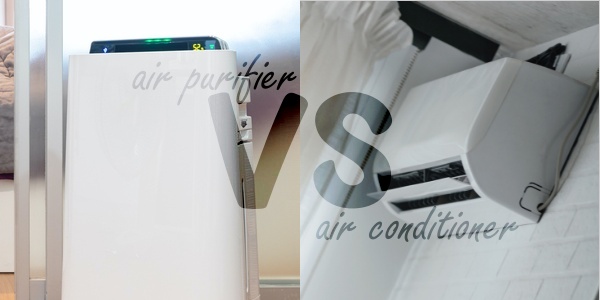
Air Purifier vs Air Conditioner: What’s the Difference?
Suppose you’re new to the world of air purifiers. In that case, you may wonder what the difference is between an air purifier and an air conditioner. In this blog post, we’ll break down the key differences between these two appliances so you can decide which one is right for you. Keep reading to learn which is better- air purifier vs air conditioner.
What is an Air Conditioner
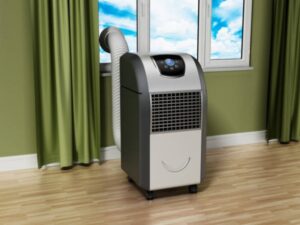
Air conditioners use a refrigeration cycle to dehumidify, cool and circulate the air in a given space. By cooling the air, air conditioners reduce the temperature of the air and make it more comfortable for people to breathe. By circulating the air, air conditioners also help to distribute heat evenly throughout a room, making it more comfortable for people to move around. Additionally, air conditioners can also be used as air purifiers. Air purifiers work by removing contaminants from the air, making it easier for people to breathe. Air conditioners are essential to many homes and businesses and play a vital role in keeping people comfortable.
How Air Conditioners Work
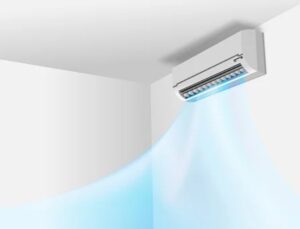
Air conditioners work by circulating air and removing heat from the space. The atmosphere is then cooled and circulated back into the room. Air conditioning units also work as air purifiers, removing pollutants and allergens from the air. To work effectively, air conditioners need to be adequately sized for the space.
If air conditioning is too small, it will not be able to remove enough heat from the air. If it is too large, it will cycle on and off too frequently, wasting energy and causing wear and tear on the unit. Air conditioners also need to be regularly maintained to work effectively. This includes cleaning or changing the air filter and ensuring that the coils are free of dust and dirt. By following these simple steps, you can ensure that your air conditioner will work effectively for many years.
Central air conditioners are a standard fixture in many homes and provide several benefits. For one, they can improve air quality by filtering out harmful particles and circulating fresh air. Additionally, they can help regulate humidity levels, preventing mould and mildew from rooting. In the summer months, central air conditioners can also keep your home cooler, making it more comfortable to spend time indoors. And in the winter, they can be used with a furnace to distribute heat evenly throughout your home. Ultimately, central air conditioners are a versatile and effective way to improve the comfort of your home year-round.l
The cooling components in window air conditioners are identical to those in central air conditioners, except they are all housed within a single unit. The cheapest and most energy-efficient sort of air conditioner is often window units. They may be moved from one room to another and used in any space with open slide-to-open windows.
What is an Air Purifier
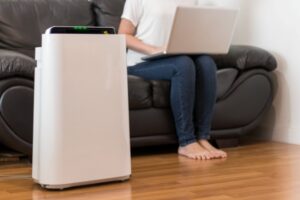
Air purifiers are devices that work to remove contaminants from the air. These devices are becoming increasingly popular in homes and office buildings, as they can help to improve air quality and reduce the risk of health problems. The most common type of air purifier uses a filter to trap pollutants, which can then be removed from the air through air movement. Other types of air purifiers use ultraviolet light or ozone to destroy contaminants. Air purifiers can be used to remove a variety of pollutants, including dust, pollen, smoke, and pet dander. In addition, they can also help to reduce the levels of harmful chemicals and bacteria in the air. By improving air quality, air purifiers can help create a healthier environment for people and pets.
How Air Purifiers Work
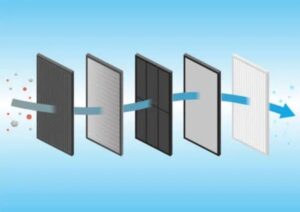
Air purifiers are devices that are designed to remove contaminants from the air. The most common type of air purifier uses a filter to trap particles, such as dust, pollen, and pet dander. Some air purifiers also use activated carbon to absorb odours and chemical vapours. Ultraviolet light air purifiers work by destroying bacteria, mould, and viruses. Ozone air purifiers release ozone into the air, which reacts with chemicals and odours, neutralising them. Air purifiers vary in effectiveness, but all work to improve air quality.
Air Purifier VS Air Conditioner
Though air purification and air conditioning have some components, such as fans, air filters and vents, their core purposes differ. Air conditioners are designed to cool the air in your home and help you maintain a specific indoor temperature. Air purifiers are made to improve indoor air quality — they have no control over the temperature in your home. That said, air purifiers can be used with air conditioners to create a more comfortable and healthy indoor environment. By removing pollutants from the air, air purifiers can help reduce air conditioners’ work to maintain a comfortable indoor temperature. In other words, air purifiers can help improve the efficiency of your air conditioner — and save you money on your energy bill.
Unlike air conditioners, air purifiers are made to be on twenty-four hours a day. This allows them to continuously turn over the air in a room, removing pollutants as the air passes through their air filters. Depending on the type of air filter in your air purifier, it may be effective against particulate matter, gaseous pollutants or both. Air purifiers with HEPA filters are especially effective at capturing and removing delicate particulate matter from the air. Suppose you’re concerned about indoor air quality. In that case, an air purifier can be a great way to help keep your home or office free of harmful contaminants.
Key Differences
Here are the key differences between air cleaners and air conditioners.
Application
Air purifiers are devices designed to remove contaminants from the air to improve indoor air quality. These devices work by drawing in philosophy from the surrounding environment and passing it through a filter or series of filters that trap particulates, dust, and other allergens. Air purifiers can be used in both residential and commercial settings. They are often used in areas where air quality is known to be poor or where there is a risk of airborne contamination. While air purifiers cannot eliminate all contaminants from the air, they can significantly reduce the levels of these pollutants, making them an essential tool for improving indoor air quality.
Benefits
An air purifier has been shown to improve overall air quality and lead to better health for everyone. However, they’re beneficial for asthmatics and allergy sufferers. The air conditioner has low ventilation purification and produces a pleasant indoor ecosystem.
Summary
- For people with allergies and asthma, an air purifier is quite helpful. Air conditioners would benefit people with chronic bronchitis who cannot afford to live in humid environments.
- An air purifier improves the efficiency of confined air by removing hazardous gases from space. While air conditioning is a recognised technique for removing heat and altering the humidity of the air in a closed area.
- Sediment, pollen, smoke, mildew particles, viruses, allergies, and certain viruses are all eliminated or reduced by an air purifier. While air conditioners slow down the warmth and moisture levels.
- An air purifier removes harmful emissions, allergens, germs, smoke, and unpleasant odours from interior air. On the other hand, the air conditioner helps reduce humidity while softening the ambient temperature.
- An air purifier considerably improves air quality, which benefits everyone’s health. While air conditioners create a comfortable home environment with a moderate level of atmospheric purification.
Conclusion
An air purifier and air conditioner have unique benefits, but which one is right for you will depend on your specific needs. If you’re looking for an appliance that can cool down a room in the summer, then an air conditioner is the better option. But an air purifier is a better choice if you’re mainly interested in improving your indoor air quality. We hope this blog post has helped clear up some confusion between these two appliances and given you a better idea of which one is right for you. Thanks for reading!
Last Updated on
- How to clean standing fan easily - September 24, 2022
- How Long Does a Fan Last? – Electric fan Maintenance Guide - September 23, 2022
- Can electric fans be left on 24 hours a day? - September 23, 2022
